最新初中英语易混易错同义词辨析大全及中考易错题精练与详解
- 格式:docx
- 大小:16.93 KB
- 文档页数:3
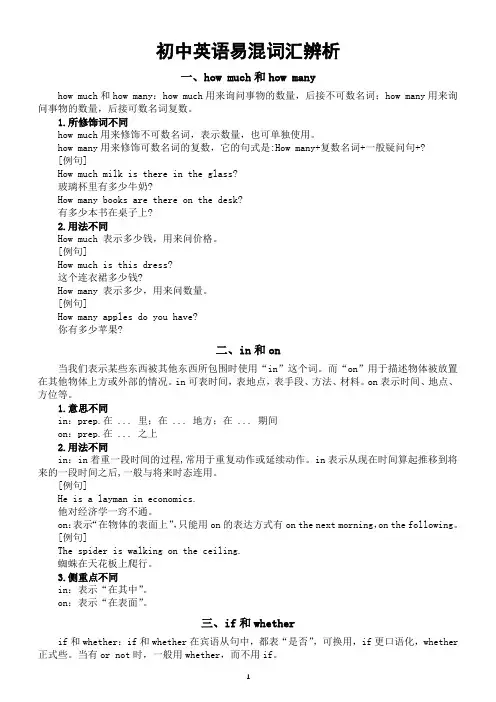
初中英语易混词汇辨析一、how much和how manyhow much和how many:how much用来询问事物的数量,后接不可数名词;how many用来询问事物的数量,后接可数名词复数。
1.所修饰词不同how much用来修饰不可数名词,表示数量,也可单独使用。
how many用来修饰可数名词的复数,它的句式是:How many+复数名词+一般疑问句+?[例句]How much milk is there in the glass?玻璃杯里有多少牛奶?How many books are there on the desk?有多少本书在桌子上?2.用法不同How much 表示多少钱,用来问价格。
[例句]How much is this dress?这个连衣裙多少钱?How many 表示多少,用来问数量。
[例句]How many apples do you have?你有多少苹果?二、in和on当我们表示某些东西被其他东西所包围时使用“in”这个词。
而“on”用于描述物体被放置在其他物体上方或外部的情况。
in可表时间,表地点,表手段、方法、材料。
on表示时间、地点、方位等。
1.意思不同in:prep.在 ... 里;在 ... 地方;在 ... 期间on:prep.在 ... 之上2.用法不同in:in着重一段时间的过程,常用于重复动作或延续动作。
in表示从现在时间算起推移到将来的一段时间之后,一般与将来时态连用。
[例句]He is a layman in economics.他对经济学一窍不通。
on:表示“在物体的表面上”,只能用on的表达方式有on the next morning,on the following。
[例句]The spider is walking on the ceiling.蜘蛛在天花板上爬行。
3.侧重点不同in:表示“在其中”。
on:表示“在表面”。
三、if和whetherif和whether:if和whether在宾语从句中,都表“是否”,可换用,if更口语化,whether 正式些。
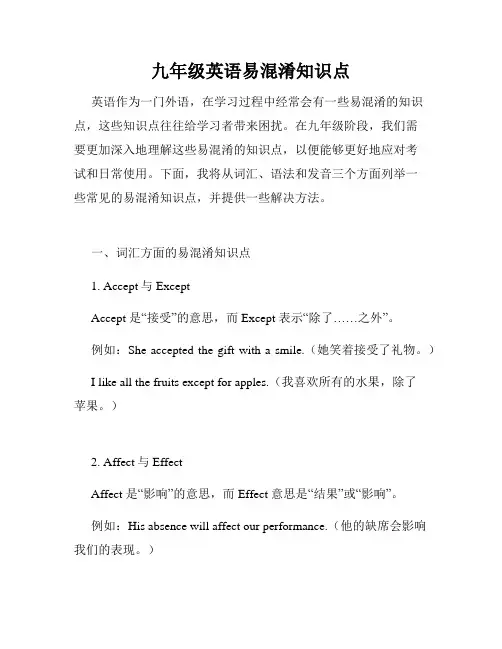
九年级英语易混淆知识点英语作为一门外语,在学习过程中经常会有一些易混淆的知识点,这些知识点往往给学习者带来困扰。
在九年级阶段,我们需要更加深入地理解这些易混淆的知识点,以便能够更好地应对考试和日常使用。
下面,我将从词汇、语法和发音三个方面列举一些常见的易混淆知识点,并提供一些解决方法。
一、词汇方面的易混淆知识点1. Accept与ExceptAccept 是“接受”的意思,而Except 表示“除了……之外”。
例如:She accepted the gift with a smile.(她笑着接受了礼物。
)I like all the fruits except for apples.(我喜欢所有的水果,除了苹果。
)2. Affect与EffectAffect 是“影响”的意思,而Effect 意思是“结果”或“影响”。
例如:His absence will affect our performance.(他的缺席会影响我们的表现。
)The medicine had a positive effect on her health.(这种药对她的健康有积极的影响。
)3. Desert与DessertDesert 是“沙漠”的意思,而Dessert 表示“甜点”。
例如:They took a trip to the desert.(他们去沙漠旅行了。
)I want some ice cream for dessert.(我想要一些冰淇淋当甜点。
)二、语法方面的易混淆知识点1. Much与ManyMuch 用于不可数名词,而Many 用于可数名词。
例如:He has much experience in this field.(他在这个领域有很多经验。
)There are many books on the shelf.(书架上有很多书。
)2. It's与ItsIt's 是 It is 或 It has 的缩写形式,而Its 是“它的”的意思。
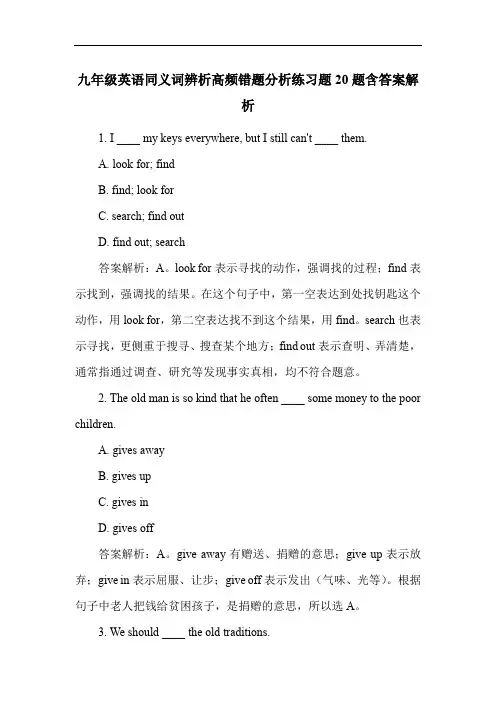
九年级英语同义词辨析高频错题分析练习题20题含答案解析1. I ____ my keys everywhere, but I still can't ____ them.A. look for; findB. find; look forC. search; find outD. find out; search答案解析:A。
look for表示寻找的动作,强调找的过程;find表示找到,强调找的结果。
在这个句子中,第一空表达到处找钥匙这个动作,用look for,第二空表达找不到这个结果,用find。
search也表示寻找,更侧重于搜寻、搜查某个地方;find out表示查明、弄清楚,通常指通过调查、研究等发现事实真相,均不符合题意。
2. The old man is so kind that he often ____ some money to the poor children.A. gives awayB. gives upC. gives inD. gives off答案解析:A。
give away有赠送、捐赠的意思;give up表示放弃;give in表示屈服、让步;give off表示发出(气味、光等)。
根据句子中老人把钱给贫困孩子,是捐赠的意思,所以选A。
3. We should ____ the old traditions.A. keep onB. keep upC. keepD. keep out答案解析:C。
keep有保持、保留的意思,在这里表示保持传统;keep on表示继续做某事;keep up表示保持( 某种状态),通常与with 搭配;keep out表示阻止进入。
这里直接说保持传统用keep即可,所以选C。
4. The noise from the street ____ me from sleeping.A. stoppedB. preventedC. keptD. all of the above答案解析:D。
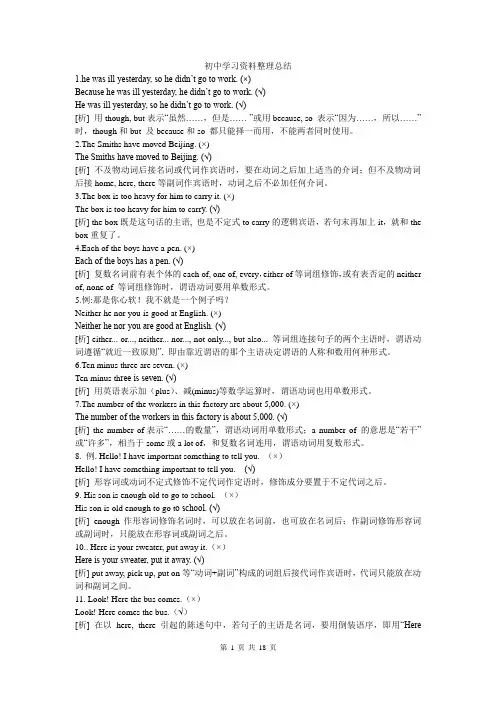
初中学习资料整理总结1.he was ill yesterday, so he didn’t go to work. (×)Because he was ill yesterday, he didn’t go to work. (√)He was ill yesterday, so he didn’t go to work. (√)[析] 用though, but表示“虽然……,但是…… ”或用because, so 表示“因为……,所以……”时,though和but 及because和so 都只能择一而用,不能两者同时使用。
2.The Smiths have moved Beijing. (×)The Smiths have moved to Beijing. (√)[析] 不及物动词后接名词或代词作宾语时,要在动词之后加上适当的介词;但不及物动词后接home, here, there等副词作宾语时,动词之后不必加任何介词。
3.The box is too heavy for him to carry it. (×)The box is too heavy for him to carr y. (√)[析] the box既是这句话的主语, 也是不定式to carry的逻辑宾语,若句末再加上it,就和the box重复了。
4.Each of the boys have a pen. (×)Each of the boys has a pen. (√)[析] 复数名词前有表个体的each of, one of, every,either of等词组修饰,或有表否定的neither of, none of 等词组修饰时,谓语动词要用单数形式。
5.例:那是你心软!我不就是一个例子吗?Neither he nor you is good at English. (×)Neither he nor you are good at English. (√)[析] either... or..., neither... nor..., not only..., but also... 等词组连接句子的两个主语时,谓语动词遵循“就近一致原则”, 即由靠近谓语的那个主语决定谓语的人称和数用何种形式。
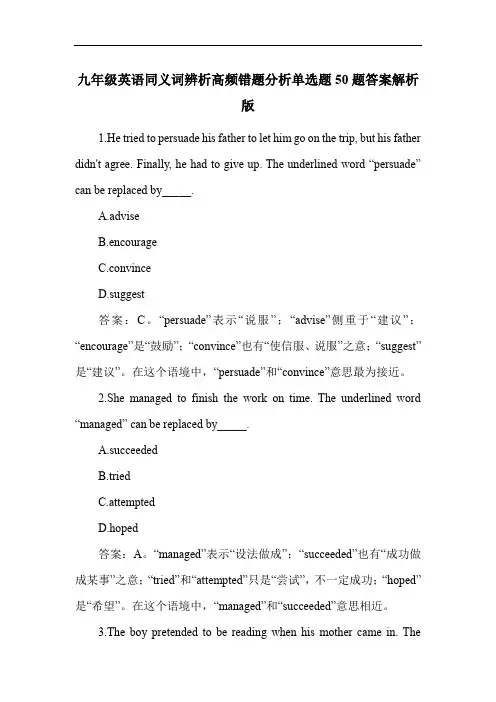
九年级英语同义词辨析高频错题分析单选题50题答案解析版1.He tried to persuade his father to let him go on the trip, but his father didn't agree. Finally, he had to give up. The underlined word “persuade” can be replaced by_____.A.adviseB.encourageC.convinceD.suggest答案:C。
“persuade”表示“说服”;“advise”侧重于“建议”;“encourage”是“鼓励”;“convince”也有“使信服、说服”之意;“suggest”是“建议”。
在这个语境中,“persuade”和“convince”意思最为接近。
2.She managed to finish the work on time. The underlined word “managed” can be replaced by_____.A.succeededB.triedC.attemptedD.hoped答案:A。
“managed”表示“设法做成”;“succeeded”也有“成功做成某事”之意;“tried”和“attempted”只是“尝试”,不一定成功;“hoped”是“希望”。
在这个语境中,“managed”和“succeeded”意思相近。
3.The boy pretended to be reading when his mother came in. Theunderlined word “pretended” can be replaced by_____.A.actedB.seemedC.appearedD.claimed答案:A。
“pretended”表示“假装”;“acted”有“装作、表现得”之意;“seemed”和“appeared”都表示“看起来”;“claimed”是“声称”。
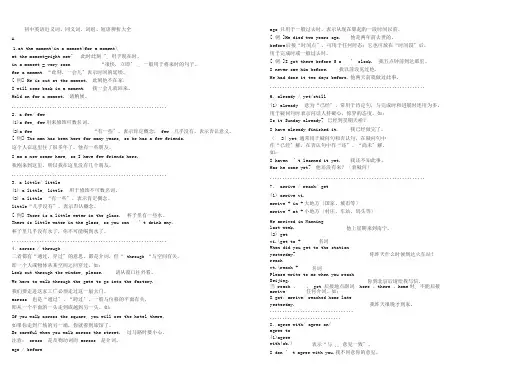
初中英语近义词、同义词、词组、短语辨析大全A1.at the moment\in a moment\for a moment\at the moment=right now" 此时此刻 ", 用于现在时。
in a moment = very soon “很快,立即〞 , 一般用于将来时的句子。
for a moment “此刻,一会儿〞表示时间的延续。
[ 例] He is out at the moment. 此刻他不在家。
I will come back in a moment. 我一会儿就回来。
Hold on for a moment. 请稍候。
.............................................................2.a few/ few(1)a few, few 用来修饰可数名词。
(2)a few “有一些〞,表示肯定概念,few 几乎没有,表示否认意义。
[ 例] The man has been here for many years, so he has a few friends.这个人在这里住了很多年了,他有一些朋友。
I am a new comer here, so I have few friends here.我刚来到这里,所以我在这里没有几个朋友。
.............................................................3.a little/ little(1) a little, little 用于修饰不可数名词。
(2) a little “有一些〞,表示肯定概念。
little “几乎没有〞,表示否认概念。
[ 例] There is a little water in the glass. 杯子里有一些水。
There is little water in the glass, so you can ’t drink any.杯子里几乎没有水了,你不可能喝到水了。
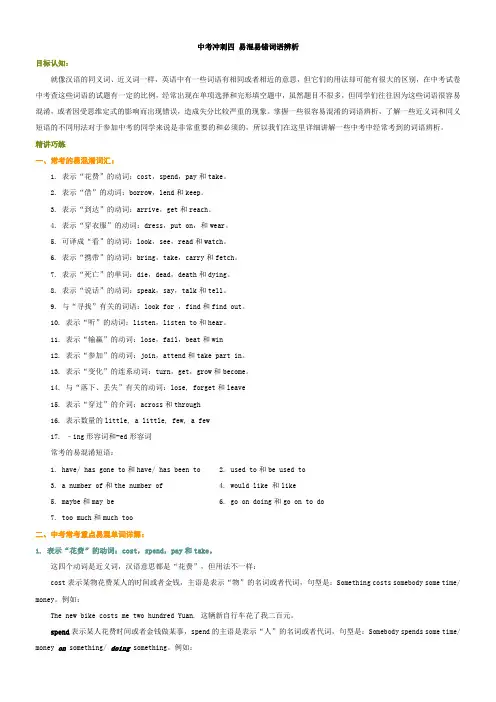
中考冲刺四易混易错词语辨析目标认知:就像汉语的同义词、近义词一样,英语中有一些词语有相同或者相近的意思,但它们的用法却可能有很大的区别,在中考试卷中考查这些词语的试题有一定的比例,经常出现在单项选择和完形填空题中,虽然题目不很多,但同学们往往因为这些词语很容易混淆,或者因受思维定式的影响而出现错误,造成失分比较严重的现象。
掌握一些很容易混淆的词语辨析,了解一些近义词和同义短语的不同用法对于参加中考的同学来说是非常重要的和必须的,所以我们在这里详细讲解一些中考中经常考到的词语辨析。
精讲巧练一、常考的易混淆词汇:1. 表示“花费”的动词:cost,spend,pay和take。
2. 表示“借”的动词:borrow,lend和keep。
3. 表示“到达”的动词:arrive,get和reach。
4. 表示“穿衣服”的动词:dress,put on,和wear。
5. 可译成“看”的动词:look,see,read和watch。
6. 表示“携带”的动词:bring,take,carry和fetch。
7. 表示“死亡”的单词:die,dead,death和dying。
8. 表示“说话”的动词:speak,say,talk和tell。
9. 与“寻找”有关的词语:look for ,find和find out。
10. 表示“听”的动词:listen,listen to和hear。
11. 表示“输赢”的动词:lose,fail,beat和win12. 表示“参加”的动词:join,attend和take part in。
13. 表示“变化”的连系动词:turn,get,grow和become。
14. 与“落下、丢失”有关的动词:lose, forget和leave15. 表示“穿过”的介词:across和through16. 表示数量的little, a little, few, a few17. –ing形容词和-ed形容词常考的易混淆短语:1. have/ has gone to和have/ has been to2. used to和be used to3. a number of和the number of4. would like 和like5. maybe和may be6. go on doing和go on to do7. too much和much too二、中考常考重点易混单词详解:1. 表示“花费”的动词:cost,spend,pay和take。
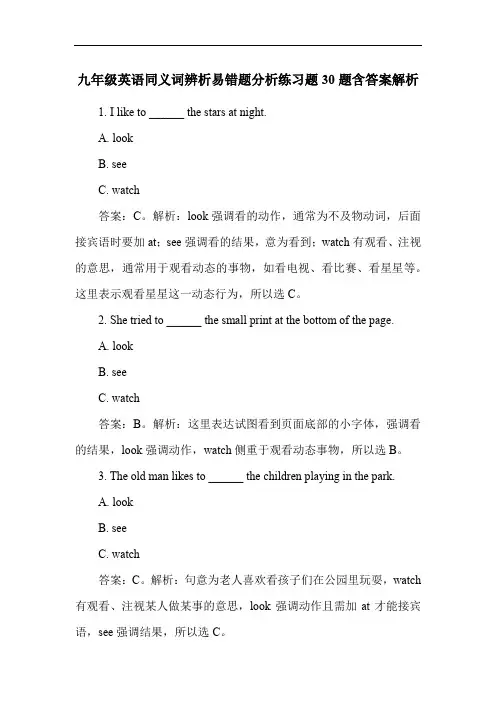
九年级英语同义词辨析易错题分析练习题30题含答案解析1. I like to ______ the stars at night.A. lookB. seeC. watch答案:C。
解析:look强调看的动作,通常为不及物动词,后面接宾语时要加at;see强调看的结果,意为看到;watch有观看、注视的意思,通常用于观看动态的事物,如看电视、看比赛、看星星等。
这里表示观看星星这一动态行为,所以选C。
2. She tried to ______ the small print at the bottom of the page.A. lookB. seeC. watch答案:B。
解析:这里表达试图看到页面底部的小字体,强调看的结果,look强调动作,watch侧重于观看动态事物,所以选B。
3. The old man likes to ______ the children playing in the park.A. lookB. seeC. watch答案:C。
解析:句意为老人喜欢看孩子们在公园里玩耍,watch 有观看、注视某人做某事的意思,look强调动作且需加at才能接宾语,see强调结果,所以选C。
4. ______! There is a beautiful bird in the tree.A. LookB. SeeC. Watch答案:A。
解析:这里是引起别人注意去看树上的鸟,look有引起别人注意看某个东西的用法,单独使用,see强调结果,watch侧重于观看动态事物,所以选A。
5. I can't ______ anything in the dark room.A. lookB. seeC. watch答案:B。
解析:在黑暗的房间里什么都看不到,强调看的结果,look强调动作,watch侧重于观看动态事物,所以选B。
6. They often ______ TV in the evening.A. lookB. seeC. watch答案:C。

九年级英语同义词辨析易错题分析练习题30题(答案解析)1.She made a beautiful dress with colorful silk. The word “silk” can be replaced by “_____”.A.materialB.clothC.fabricD.textile答案解析:C。
“silk”是丝绸,“fabric”有织物、织品的意思,涵盖了丝绸等各种材料;“material”更侧重于材料的统称;“cloth”一般指布料、布;“textile”指纺织品,不如“fabric”准确地对应丝绸。
2.He gave a wonderful speech at the meeting. The word “speech” can be replaced by “_____”.A.talkB.lectureC.addressD.discourse答案解析:C。
“speech”和“address”都有演讲、演说的意思,较为正式;“talk”比较随意的交谈;“lecture”通常指学术性的讲座;“discourse”更偏向于论述、交谈。
3.The workers are building a new bridge. The word “bridge” can be replaced by “_____”.A.spanB.passageC.crossingD.structure答案解析:A。
“bridge”和“span”都有桥梁的意思,“span”更强调跨越的部分;“passage”通道;“crossing”十字路口、人行横道;“structure”结构,不能准确表示桥梁。
4.She has a lot of books in her room. The word “books” can be replaced by “_____”.A.volumesB.tomesC.copiesD.editions答案解析:A。
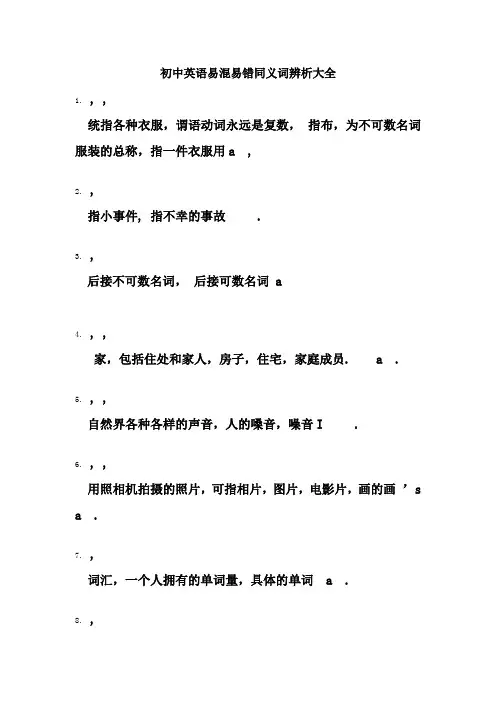
初中英语易混易错同义词辨析大全1., ,统指各种衣服,谓语动词永远是复数,指布,为不可数名词服装的总称,指一件衣服用a ,2.,指小事件, 指不幸的事故 .3.,后接不可数名词,后接可数名词 a4., ,家,包括住处和家人,房子,住宅,家庭成员. a .5., ,自然界各种各样的声音,人的嗓音,噪音I .6., ,用照相机拍摄的照片,可指相片,图片,电影片,画的画’s a .7.,词汇,一个人拥有的单词量,具体的单词 a .8.,人口,人数,具体的人 a .9.,一天内具体的天气状况,长期的气候状况 .10., , ,具体的公路,马路,街道,小路,小径,道路,途径; , .11. ,课程〔可包括多门科目〕,科目〔具体的学科〕a12.,传统风俗,习俗,也可指生活习惯,后接,生活习惯,习惯成自然,后接. I’ a .13.,指造成某一事实或现象的直接原因,后接,用来解释某种现象或结果的理由,后接 .14., ,运动,锻炼〔不可数〕,练习〔可数〕,〔反复做的〕练习 .15.,作"课"解时,两者可以替换.指课文用. 指班级或全体学生用. 6; 516. , ,指在公共场所所做的经过准备的较正式的演说,日常生活中的一般的谈话,讲话,学术性的演讲,讲课 a …17.,部队的军官,政府官员18.,二者均指工作。
不可数,可数 a19.,主要指人或动物,多指由两局部组成的东西 a20. , , ,侧重指幅员,疆域,指人民,国民,民族,侧重指政府,政体,国土,国家 .21.,厨师,厨具 a .22.,不可数名词, 损害,损失; 复数形式, 赔偿金 $90023.,警察的总称,后接复数谓语动词,指某个具体的警察 .24. ,常和困难连系,前面的动词常为 , , ,常和疑问连系,多和, 连用25., a人类,a 一个男人 .26.,二者均可指小鸡,还可以当鸡肉 .27.,当电报解时,指具体的,指抽象的 a ,28., , ,是最常用的,指短期的旅途,指稍长的旅途,指海上航行 a29.,多指户外的游戏或娱乐活动,如打球,游泳,打猎,赛马等;指决定胜负的游戏,通常有一套规那么 .30.,价格,奖,奖品,奖金 .31. a ,a 许多,谓语动词用复数。
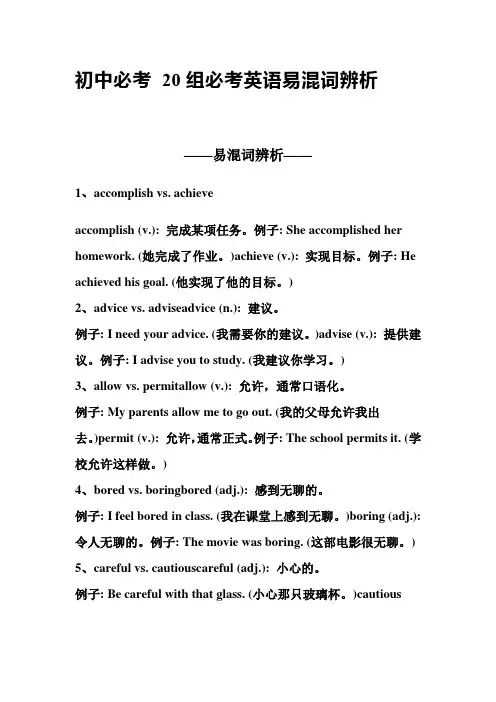
初中必考20组必考英语易混词辨析——易混词辨析——1、accomplish vs. achieveaccomplish (v.): 完成某项任务。
例子: She accomplished her homework. (她完成了作业。
)achieve (v.): 实现目标。
例子: He achieved his goal. (他实现了他的目标。
)2、advice vs. adviseadvice (n.): 建议。
例子: I need your advice. (我需要你的建议。
)advise (v.): 提供建议。
例子: I advise you to study. (我建议你学习。
)3、allow vs. permitallow (v.): 允许,通常口语化。
例子: My parents allow me to go out. (我的父母允许我出去。
)permit (v.): 允许,通常正式。
例子: The school permits it. (学校允许这样做。
)4、bored vs. boringbored (adj.): 感到无聊的。
例子: I feel bored in class. (我在课堂上感到无聊。
)boring (adj.): 令人无聊的。
例子: The movie was boring. (这部电影很无聊。
)5、careful vs. cautiouscareful (adj.): 小心的。
例子: Be careful with that glass. (小心那只玻璃杯。
)cautious(adj.): 小心翼翼的,避免风险。
例子: He is cautious with money. (他在处理钱时很小心。
)6、common vs. ordinarycommon (adj.): 普遍的。
例子: It is common to use phones. (使用手机是很常见的。
初中英语总复习易混词盘点初中英语总复习易混词盘点从近年来的中考题可以看出命题者的目的都是要考查学生对一些较易混淆、形式上非常相近的词(词组)是否能掌握扎实,是否熟悉每个词组的中文意思并能在句子中熟练运用。
要想做对以上出现的类似的中考考题,考生必须能总结清各种初中阶段所学过的较易混淆、形式上非常相近的词(词组),熟记所有词组的中文意思,熟悉它们的用法和区别。
为了方便同学们复习,特将常考易混词(词组)整理如下:一、容易混淆的动词:[考试说明] 了解及物动词和不及物动词用法;掌握动词不定式作宾语、宾语补足语、状语以及疑问词连用构成不定式短语的基本用法;理解动词不定式作主语和定语的用法;初步掌握延续性动词和瞬间动词在用法上的区别等。
1. come & be here[误] He has come here for three hours.[正] He came here three hours ago.[正] He has been here for three hours.come是瞬间动词,不是延续性动词,在肯定句中不能与表示一段时间的状语连用。
而要与表示一段时间的状语连用,就要用延续动词。
与此同类的还有borrow/lend-keep; join-be in/at; die-be dead; buy-have; leave-be away,etc.2. cost & take & spend & pay[误] I cost a lot of time to read stories.[正] It cost me a lot of time to read stories.[正] I spent a lot of time reading stories.cost除了钱的花费以外,还能表示时间上的花费,但常用物做主语。
spend句子主语是人,可指花费时间和金钱,但后面的动词要用-ing形式,后面也可跟名词短语,介词用on。
初中英语同义词辨析英语学习过程中经常遇到同义、近义词的辨析,这是英语学习的难点之一,也是中考考点之一,现在把自己整理的一些初中常见的同义近义词的辨析放在这里,和朋友们交流,也供学生朋友选择学习。
1、talk tell speak sayspeak 和talk 通常用作不及物动词,都有“说话”之意。
在会议上发言用speak,名词为speech;随便漫谈用talk,其名词还是talk;tell表示“讲述”或“告诉”;say表示“说”;例如:can we speak about plans for the holidays?我们谈谈假期的打算好吗?the patient is too weak to speak.病人太衰弱了,不能说话。
my father was talking with my teacher when i got home yesterday。
昨天我到家时我父亲正在和我的老师谈话。
i always tell my daughter a story before she goes to sleep.女儿睡觉之前,我总讲故事给她听。
it‘s impossible to tell who will win the next election.下届选举谁能获胜无法预知。
she said nothing to me about it.关于这一点,她什么也没有对我讲。
*speak 当及物动词用时,宾语一般是语言或词语之类的词。
如: does anyone speak english here? 这儿有人会说英语吗?2、good well nicegood 形容词,好的,合适的,新鲜的,擅长的。
well 作形容词时,指"(身体)健康的”;还可用作副词,修饰动词。
nice形容词,美好的,令人愉快的,可爱的,特指取悦感官的事物。
she is good at english.她擅长英语。
this cake tastes good.这蛋糕好吃。
九年级英语同义词辨析易错题分析练习题30题(带答案)1.She tried to persuade him to stay, but he insisted on leaving.persuadeforceencouragelet答案解析:persuade。
“persuade”表示说服,强调通过劝说使某人改变想法;“force”是强迫;“encourage”是鼓励;“let”是让。
这里说她努力劝说他留下但他坚持离开,“persuade”符合语境。
2.He managed to finish the work on time.succeeded intried toattempted towanted to答案解析:succeeded in。
“managed to”和“succeeded in”都表示成功做某事;“tried to”和“attempted to”是尝试做某事,不一定成功;“wanted to”是想要做某事。
这里说他按时完成了工作,所以是成功做某事,“succeeded in”正确。
3.The teacher asked us to remember these words.recallforgetignore答案解析:memorize。
“remember”和“memorize”都有记住的意思;“recall”是回忆起;“forget”是忘记;“ignore”是忽视。
老师让我们记住这些单词,“memorize”更强调记忆的动作,符合题意。
4.She decided to go shopping instead of staying at home.choseplannedintendedthought答案解析:chose。
“decided to”和“chose”都表示决定做某事;“planned”是计划;“intended”是打算;“thought”是想。
这里说她决定去购物而不是待在家里,“chose”符合语境。
九年级英语同义词辨析易错题分析单选题50题1. In the family, the ______ of responsibility is shared among all members.A. weightB. burdenC. loadD. stress答案:B。
本题考查名词“负担”的同义词辨析。
“weight”主要指物体的重量;“burden”强调沉重、令人烦恼的负担;“load”侧重于指装载的货物或工作量;“stress”更多指精神上的压力。
在家庭中,“responsibility”(责任)更倾向于被描述为一种令人感到有压力的“burden”(负担)。
2. At school, the ______ of knowledge is passed from teachers to students.A. amountB. quantityC. numberD. mass答案:A。
此题考查名词“数量”的同义词辨析。
“amount”通常用于不可数名词,表示数量;“quantity”既可以修饰可数名词,也可以修饰不可数名词;“number”用于可数名词;“mass”指大量、众多,常指物体的质量。
知识“knowledge”是不可数名词,这里用“amount”更合适。
3. The ______ of homework given by the teacher was too much for us.A. partB. pieceC. portionD. section答案:C。
本题考查名词“部分”的同义词辨析。
“part”强调整体中的部分;“piece”常指单个的物品或部分;“portion”侧重指分配的量;“section”指整体的一部分,常指区域或章节。
老师布置的作业量用“portion”更能体现出分配的含义。
4. In the library, there are many ______ of books on different subjects.A. kindsB. typesC. sortsD. classes答案:A。
初中英语易混易错同义词辨析大全及中考易错题精练与详解(一)初中英语易混易错同义词辨析大全1.clothes, cloth, clothingclothes统指各种衣服,谓语动词永远是复数,cloth指布,为不可数名词clothing 服装的总称,指一件衣服用a piece of, an article of2.incident, accidentincident指小事件, accident指不幸的事故He was killed in the accident.3.amount, numberamount后接不可数名词,number后接可数名词a number of students4.family, house, homehome 家,包括住处和家人,house房子,住宅,family家庭成员. My family is a happy one.5.sound, voice, noisesound自然界各种各样的声音,voice人的嗓音,noise噪音I hate the loud noise outside.6.photo, picture, drawingphoto用照相机拍摄的照片,picture可指相片,图片,电影片,drawing画的画Let’s go and see a good picture.7.vocabulary, wordvocabulary词汇,一个人拥有的单词量,word具体的单词He has a large vocabulary.8.population, peoplepopulation人口,人数,people具体的人China has a large population.9.weather, climateweather一天内具体的天气状况,climate长期的气候状况The climate here is not good for you.10.road, street, path, wayroad具体的公路,马路,street街道,path小路,小径,way道路,途径take this road; in the street, show me the way to the museum.11. course, subjectcourse课程(可包括多门科目),subject科目(具体的学科)a summer course12.custom, habitcustom传统风俗,习俗,也可指生活习惯,后接to do,habit生活习惯,习惯成自然,后接of doing. I’ve got the habit of drinking a lot.13.cause, reasoncause 指造成某一事实或现象的直接原因,后接of sth./doing sth,reason用来解释某种现象或结果的理由,后接for sth./doing sth. the reason for being late14.exercise, exercises, practiceexercise运动,锻炼(不可数),exercises练习(可数),practice(反复做的)练习Practice makes perfect.15.class, lesson作"课"解时,两者可以替换.指课文用lesson. 指班级或全体学生用class. lesson 6; class 516. speech, talk, lecturespeech指在公共场所所做的经过准备的较正式的演说,talk日常生活中的一般的谈话,讲话,lecture学术性的演讲,讲课a series of lecture on…17.officer, officialofficer部队的军官,official政府官员an army officer18.work, job二者均指工作。
九年级英语同义词辨析高频错题分析练习题20题含答案解析1.She tried to persuade him to change his mind, but he remained firm.- insist- persist- adhere- persevere答案解析:persist。
“persuade”表示劝说,“remain firm”表示坚持不变。
“insist”侧重于坚持某种意见或主张;“persist”强调不顾困难、反对等坚持做某事;“adhere”主要指黏附、坚持信仰等;“persevere”则侧重于坚持不懈地努力。
在这个语境中,“persist”更符合不顾他人劝说而坚持的意思。
2.He promised to finish the work on time and he fulfilled his promise.- accomplish- complete- achieve- perform答案解析:complete。
“finish”和“fulfill his promise”暗示完成任务。
“accomplish”和“achieve”更强调通过努力达成目标;“perform”侧重于执行任务;“complete”则单纯表示完成工作,最符合题意。
3.The car stopped suddenly and he had to brake hard.- halt- pause- cease- suspend答案解析:halt。
“stop suddenly”说明车突然停下。
“halt”强调突然停止;“pause”是暂停;“cease”指停止某种状态或行为;“suspend”常指暂停或悬挂。
“halt”最符合车突然停下的情景。
4.She always tries to avoid making mistakes.- escape- evade- shun- elude答案解析:avoid。
最新初中英语易混易错同义词辨析大全及中考易错题精练与详
解
最新初中英语易混易错同义词辨析大全
及中考易错题精练与详解
(一)初中英语易混易错同义词辨析大全
1.clothes, cloth, clothing
clothes统指各种衣服,谓语动词永远是复数,cloth指布,为不可数名词clothing 服装的总称,指一件衣服用a piece of, an article of
2.incident, accident
incident指小事件, accident指不幸的事故He was killed in the accident.
3.amount, number
amount后接不可数名词,number后接可数名词a number of students
4.family, house, home
home 家,包括住处和家人,house房子,住宅,family家庭成员. My family is a happy one.
5.sound, voice, noise
sound自然界各种各样的声音,voice人的嗓音,noise噪音I hate the loud noise outside.
6.photo, picture, drawing
photo用照相机拍摄的照片,picture可指相片,图片,电影片,drawing画的画Let’s go and see a good picture.
7.vocabulary, word
vocabulary词汇,一个人拥有的单词量,word具体的单词He has a large vocabulary.
8.population, people
population人口,人数,people具体的人China has a large
population.
9.weather, climate
weather一天内具体的天气状况,climate长期的气候状况The climate here is not good for you.
10.road, street, path, way
road具体的公路,马路,street街道,path小路,小径,way道路,途径
take this road; in the street, show me the way to the museum.
11. course, subject
course课程(可包括多门科目),subject科目(具体的学科)a summer course
12.custom, habit
custom传统风俗,习俗,也可指生活习惯,后接to do,habit 生活习惯,习惯成自然,后接of doing. I’ve got the habit of drinking a lot.
13.cause, reason
cause 指造成某一事实或现象的直接原因,后接of sth./doing sth,reason用来解释某种现象或结果的理由,后接for sth./doing sth. the reason for being late
14.exercise, exercises, practice
exercise运动,锻炼(不可数),exercises练习(可数),practice(反复做的)练习Practice makes perfect.
15.class, lesson
作"课"解时,两者可以替换.指课文用lesson. 指班级或全体学生用class. lesson 6; class 5
16. speech, talk, lecture
speech指在公共场所所做的经过准备的较正式的演说,talk日常生活中的一般的谈话,讲话,lecture学术性的演讲,讲课a series of lecture on…
17.officer, official
officer部队的军官,official政府官员an army officer
18.work, job
二者均指工作。
work不可数,job可数 a good job
19.couple, pair
couple主要指人或动物,pair多指由两部分组成的东西 a pair of trousers
20. country, nation, state, land
country侧重指版图,疆域,nation指人民,国民,民族,state 侧重指政府,政体,land国土,国家The whole nation was sad at the news.
21.cook, cooker
cook厨师,cooker厨具He is a good cook.
22.damage, damages
damage不可数名词, 损害,损失; damages复数形式, 赔偿金$900 damages
23.police, policeman
police警察的总称,后接复数谓语动词,policeman 指某个具体的警察The police are questioning everyone in the house.
24. problem, question
problem常和困难连系,前面的动词常为think about, solve, raise,question常和疑问连系,多和ask, answer连用
25.man, a man
man人类,a man一个男人Man will conquer nature.
26.chick, chicken。